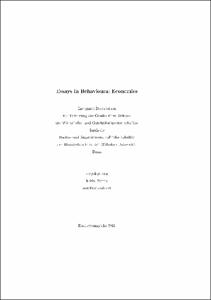Seithe, Mirko: Essays in Behavioural Economics. - Bonn, 2011. - Dissertation, Rheinische Friedrich-Wilhelms-Universität Bonn.
Online-Ausgabe in bonndoc: https://nbn-resolving.org/urn:nbn:de:hbz:5-27467
Online-Ausgabe in bonndoc: https://nbn-resolving.org/urn:nbn:de:hbz:5-27467
@phdthesis{handle:20.500.11811/4876,
urn: https://nbn-resolving.org/urn:nbn:de:hbz:5-27467,
author = {{Mirko Seithe}},
title = {Essays in Behavioural Economics},
school = {Rheinische Friedrich-Wilhelms-Universität Bonn},
year = 2011,
month = dec,
note = {The goal of behavioural economics is to improve classic microeconomic theory by introducing motives and concepts from related fields like psychology and sociology. The driving paradigm of most neo-classical economic research is the concept of the Homo Oeconomicus, a human who approaches all problems in a rational and typically selfish way and who possesses boundless computational power and flawless reasoning. Despite the obvious oversimplification, the given assumptions allow the precise analysis of a large number of complex problems and have led to many interesting and often surprising findings and theories.
While the value of constructing theoretical economic models is beyond doubt, it is important to be aware that the simplifying assumptions made within limit the scope of the predictions made. The assumption that perfectly reasonable people interact in a strictly logical way often leads to conclusions which bear no resemblance to real-world observations. The role of behavioural economic research is not to abandon theoretical research but to question and test the assumptions made by economic models, to identify contradictions to actual observations when they occur and to develop alternative models to capture apparent flaws in the models, or, as one might argue, flaws in human behaviour. Examples for such flaws include loss aversion1 and non-exponential discounting which, despite being irrational from a theoretical perspective, seem to be prevalent themes in human behaviour. Social preferences play a role when people interact and social norms cause them to behave in a nice way when treated well or to reciprocate and punish their counterpart even at their own expense.
Furthermore humans have difficulties when dealing with complex problems, which is referred to as bounded rationality. People tend to make calculation mistakes, use rough approximations and imprecise simplifications when facing difficult problems.
The first three chapters of this dissertation cover three different topics tied to behavioural economics. They connect concepts originating from psychology and sociology like intrinsic and extrinsic motivation and the so-called locus of control and apply them to microeconomic problems like the optimal effort provision in a principal-agent setting. The fourth chapter is strongly related to computer science as it describes the development of a computer system intended to simplify the design and conduction of economic experiments. While it is the project most distant to economics, it is arguably also the most ambitious of the four projects.},
url = {https://hdl.handle.net/20.500.11811/4876}
}
urn: https://nbn-resolving.org/urn:nbn:de:hbz:5-27467,
author = {{Mirko Seithe}},
title = {Essays in Behavioural Economics},
school = {Rheinische Friedrich-Wilhelms-Universität Bonn},
year = 2011,
month = dec,
note = {The goal of behavioural economics is to improve classic microeconomic theory by introducing motives and concepts from related fields like psychology and sociology. The driving paradigm of most neo-classical economic research is the concept of the Homo Oeconomicus, a human who approaches all problems in a rational and typically selfish way and who possesses boundless computational power and flawless reasoning. Despite the obvious oversimplification, the given assumptions allow the precise analysis of a large number of complex problems and have led to many interesting and often surprising findings and theories.
While the value of constructing theoretical economic models is beyond doubt, it is important to be aware that the simplifying assumptions made within limit the scope of the predictions made. The assumption that perfectly reasonable people interact in a strictly logical way often leads to conclusions which bear no resemblance to real-world observations. The role of behavioural economic research is not to abandon theoretical research but to question and test the assumptions made by economic models, to identify contradictions to actual observations when they occur and to develop alternative models to capture apparent flaws in the models, or, as one might argue, flaws in human behaviour. Examples for such flaws include loss aversion1 and non-exponential discounting which, despite being irrational from a theoretical perspective, seem to be prevalent themes in human behaviour. Social preferences play a role when people interact and social norms cause them to behave in a nice way when treated well or to reciprocate and punish their counterpart even at their own expense.
Furthermore humans have difficulties when dealing with complex problems, which is referred to as bounded rationality. People tend to make calculation mistakes, use rough approximations and imprecise simplifications when facing difficult problems.
The first three chapters of this dissertation cover three different topics tied to behavioural economics. They connect concepts originating from psychology and sociology like intrinsic and extrinsic motivation and the so-called locus of control and apply them to microeconomic problems like the optimal effort provision in a principal-agent setting. The fourth chapter is strongly related to computer science as it describes the development of a computer system intended to simplify the design and conduction of economic experiments. While it is the project most distant to economics, it is arguably also the most ambitious of the four projects.},
url = {https://hdl.handle.net/20.500.11811/4876}
}






